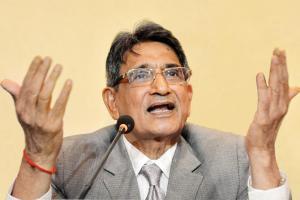Indian board's clean-up man Justice RM Lodha, unhappy with court-granted modifications; stresses cricket body has a 'weakened structure'

Former Chief Justice of India RM Lodha
Former Chief Justice of India RM Lodha, whose committee was empowered to suggest the recommendations for setting the functioning of the Board of Control for Cricket in India (BCCI) in a fair and transparent manner, was disappointed with Supreme Court's modified judgment yesterday. Justice Lodha said CJI Dipak Misra's bench has 'diluted' the principal judgment passed by the apex court under ex-CJI TS Thakur on July 18, 2016.
Yesterday, the Supreme Court decided to modify the key recommendations such as one-state-one-vote, cooling-off period for administrators and also reverted to the five-selector policy instead of three. CJI Misra's bench, however, did not alter any other recommendations which were accepted by the apex court in 2016.
ADVERTISEMENT
Justice RM Lodha, whose three-member committee spent close to three years in formulating cricket administration in India, said yesterday's judgement has eroded the core values of their recommendations. "It is disappointing, because the cooling off and one-state-one-vote were core recommendations. And having being diluted now, the structure we had suggested, has weakened. As a matter of fact, our report was accepted by the Hon'ble Supreme Court on July 18, 2016," Justice Lodha told mid-day from New Delhi.
Modifications questioned
He is shocked that the principal judgment was modified despite the BCCI exhausting the review and curative petitions options. "I will have to figure out the legal reasons or legal principles which have been invoked by the Supreme Court in modifying the final order [of July 2016]," he said. The SC restored full membership for the three associations in Maharashtra and Gujarat, but decided to take away the votes from Mumbai's Cricket Club of India, one of the founder members of the BCCI, and the National Cricket Club based in Kolkata.
While the states that went unrepresented in the BCCI so far will get their membership right as per the Justice Lodha report, yesterday's judgment decided to grant voting rights to Railways, Universities and Services for their contribution to Indian cricket. "To utilise territoriality as a basis of exclusion is problematic because it ignores history and the contribution made by the above associations to the development of cricket and its popularity," Justice Dr DY Chandrachud said in the judgment.
Justice Lodha felt restoring full memberships for states like Gujarat and Maharashtra will disturb the level-playing field. "They [associations in Gujarat and Maharashtra] would have continued to receive the same grant while also continuing to play same number of matches. We wanted to put their voting rights at par so, that there is no imbalance while exercising voting powers by the state in the election of office-bearers or Apex Council.
Now, that imbalance will be restored because Western states like Gujarat and Maharashtra will have three votes each. However, a big state like Uttar Pradesh and Bihar will still have just one, but these two states will have six votes overall. So, the power centres will continue with these states as they have three votes each. That balance which we created and which was accepted by the Supreme Court in its primary judgment is now modified," said Justice Lodha. Regarding the cooling off issue, the modified judgment will allow office-bearers to contest for two consecutive terms either at the BCCI or at state association. Justice Chandrachud has provided an extensive explanation to avoid any ambiguity in his judgment.
Justice Lodha felt their recommendation to have a cooling off period after every term was important. "Our idea was to break monopoly to ensure that there is no concentration of power in the hands of same office bearers contesting again and again. But now they are permitted to contest for two tenures [in succession], so obviously it will again result in concentration of power and monopoly for at least six years which we wanted to disband," he said.
5-selector policy reverted
Justice Lodha also came down heavily on having five selectors. "You may have so many matches to watch... it doesn't matter. Three [selectors] was to ensure that the regional imbalance and regional power centres is avoided. Three top selectors can keep a complete eye on the players and with modern technology, this is quite possible. It is unfortunate that they have reverted to the five-selector policy," he said.
Until the elections to the BCCI take place, the SC-appointed Committee of Administrators (CoA) is empowered to consult with the Cricket Advisory Committee, comprising of reputed former international cricketers and to constitute a Committee of Selectors consistent with the above criteria.
Catch up on all the latest T20 news and updates here. Also download the new mid-day Android and iOS apps to get latest updates
 Subscribe today by clicking the link and stay updated with the latest news!" Click here!
Subscribe today by clicking the link and stay updated with the latest news!" Click here!







